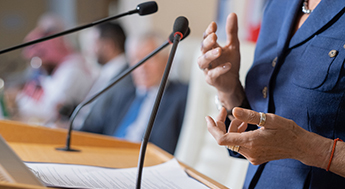Mary McGrath
Assistant Professor of Political Science
PhD, Yale University, 2016
Political scientist Mary McGrath looks into the balance of reason and reflex underpinning our actions and beliefs: What commonalities are we able to uncover in how we evaluate and respond to the world around us? This has translated into a research agenda that covers American politics, political psychology and behavior, and political economy. She uses a range of quantitative methods to investigate processes of political and economic decision-making, opinion formation, and belief.
McGrath’s research has been published in Nature Human Behavior, Nature Climate Change, The Annals of the American Academy of Political and Social Science, and the Quarterly Journal of Political Science. She received her PhD in political science from Yale University.
Current Research
Bridging Divides on Climate Change Opinion: Personally-close and ideologically distant discussion partners. When people are equipped with shared information and structured discussion-guidance, can conversations with family or friends with whom they differ on important political issues (i.e., personally-close but ideologically-distant others) lead to (i) a decrease in “political sectarian” attitudes, (ii) opinion change, and (iii) increased political engagement on an issue.
How Does Collaboration Affect Political Interactions? McGrath seeks to understand how collaboration shapes political interactions and engagement, asking the following key questions: Does collaboration increase tolerance toward the collaborator? Does it increase trust? Are collaborators more persuasive? In an ongoing project, McGrath examines the far-reaching effects of collaboration in political life.
Selected Publications
Myers, E., A. Wander, and M. McGrath. Electoral costs of political retaliation: Bipartisan rejection of attacks on corporate speech. Business and Politics 1–17. doi:10.1017/bap.2025.10
Saltzer, S., and M. McGrath. 2024. Voter bias and the partisan gender gap in office. Political Behavior 46: 473–500.
McGrath, M. 2020. Experiments on problems of climate change. In Advances in Experimental Political Science, 606–29, eds. J. Druckman and D. Green (Cambridge: Cambridge University Press).
Finkel, E., C. Bail, M. Cikara, P. Ditto, S. Iyengar, S. Klar, L. Mason, M. McGrath, B. Nyhan, D. Rand, L. Skitka, J. Tucker, J. Van Bavel, C. Wang, and J. Druckman. 2020. Political sectarianism in America. Science 370(6516): 533–36.
McGrath, M., and A. Gerber. 2019. Experimental evidence for a pure collaboration effect. Nature Human Behaviour 3: 354–60.
Druckman, J., and M. McGrath. 2019. The evidence for motivated reasoning in climate change preference formation. Nature Climate Change 9: 111–19.
McGrath, M. 2017. Economic behavior and the partisan perceptual screen. Quarterly Journal of Political Science 11(4): 363–83.


